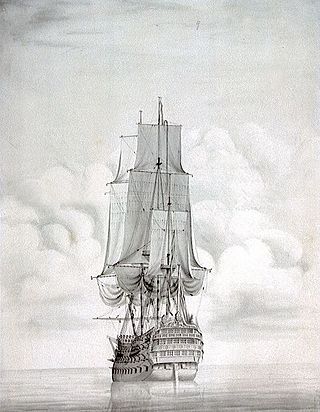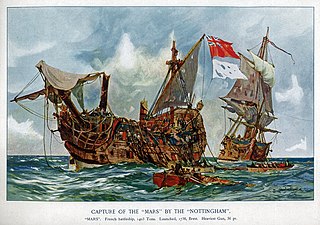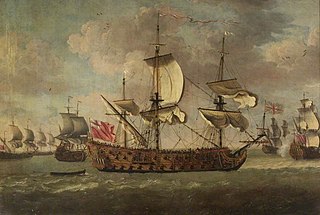
HMS Vanguard was a 90-gun second-rate ship of the line of the Royal Navy, built at Portsmouth Dockyard and launched in 1678.

HMS Royal Oak was a 74-gun third-rate ship of the line of the Royal Navy, built by Jonas Shish at Deptford and launched in 1674. She was one of only three Royal Navy ships to be equipped with the Rupertinoe naval gun. Life aboard her when cruising in the Mediterranean Sea in 1679 is described in the diary of Henry Teonge.

HMS Nottingham was a 60-gun fourth-rate ship of the line of the Royal Navy, built at Deptford Dockyard and launched on 10 June 1703. She was the first ship to bear the name.

HMS Duke was a 90-gun second-rate ship of the line of the Royal Navy, launched on 13 June 1682 at Woolwich Dockyard.

HMS Royal Sovereign was a 100-gun first rate ship of the line of the Royal Navy, built at Woolwich Dockyard and launched in July 1701. She had been built using some of the salvageable timbers from the previous Royal Sovereign, which had been destroyed by fire in 1697.
HMS Greenwich was a 54-gun fourth-rate ship of the line of the Royal Navy, built by Christopher Pett at Woolwich Dockyard and launched in 1666.

HMS Falkland was a 50-gun fourth-rate ship of the line of the Royal Navy, built by Holland of New Castle, New Hampshire, and purchased by the navy in 1696.

HMS Swiftsure was a 70-gun third-rate ship of the line of the Royal Navy, built by Sir Anthony Deane at Harwich, and launched in 1673. By 1685 she had been reduced to a 66-gun ship.

President was a 38-gun fourth rate frigate of the Royal Navy, originally built for the navy of the Commonwealth of England by Peter Pett I at Deptford Dockyard, and launched in 1650.
HMS President was a 34-gun fourth-rate of the English Navy, built by Peter Pett I at Deptford Dockyard and launched in 1650. She was incorporated into the Commonwealth Navy in 1650. She partook in the Battle off Dover and Kentish Knock in 1652, the Battle of Portland, the Gabbard and Scheveningen in 1653. She was renamed Bonaventure in 1660. After the Restoration she was incorporated into the Royal Navy. She was present at the Battle of Lowestoft (1665), the Four Days Battle and the Oxfordness in 1666. She was rebuilt in 1666. She was present at the Battle of Martinique in 1667, Battle of Solebay (1672), Battle of Schooneveld and Texel in 1673, the Battle of Beachy Head in 1690, the Battle of Barfleur 1692.
HMS Albemarle was a 90-gun second rate ship of the line of the Royal Navy, launched on 29 October 1680 at Harwich.

HMS Boyne was an 80-gun third-rate ship of the line of the Royal Navy, launched at Deptford Dockyard on 21 May 1692.

HMS Russell was an 80-gun third rate ship of the line of the Royal Navy, launched at Portsmouth Dockyard on 3 June 1692.

HMS Humber was an 80-gun third rate ship of the line of the Royal Navy, launched at Hull on 30 March 1693.

HMS Newark was an 80-gun third rate ship of the line of the Royal Navy, launched at Hull on 3 June 1695.

HMS Canterbury was a 60-gun fourth-rate ship of the line of the Royal Navy, launched at Deptford on 18 December 1693.

HMS Windsor was a 60-gun fourth rate ship of the line of the Royal Navy, launched at Deptford on 31 October 1695.

HMS St Albans was a 50-gun fourth rate ship of the line of the Royal Navy, built at Rotherhithe and launched on 10 December 1706.

HMS Plymouth was a 60-gun fourth rate ship of the line of the Royal Navy, built at Devonport Dockyard to the 1706 Establishment of dimensions, and launched on 25 May 1708.
HMS Romney was a 50-gun fourth rate ship of the line of the Royal Navy, built by Sir Joseph Allin to the 1706 Establishment at Deptford Dockyard, and launched on 2 December 1708.














